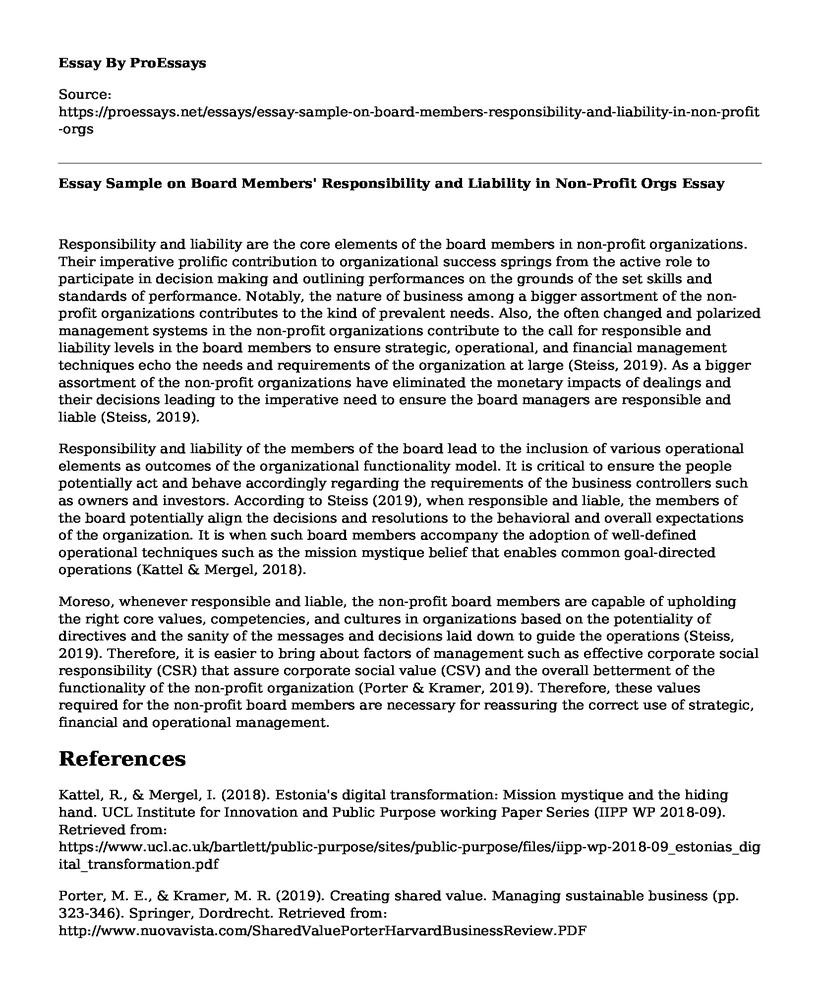Responsibility and liability are the core elements of the board members in non-profit organizations. Their imperative prolific contribution to organizational success springs from the active role to participate in decision making and outlining performances on the grounds of the set skills and standards of performance. Notably, the nature of business among a bigger assortment of the non-profit organizations contributes to the kind of prevalent needs. Also, the often changed and polarized management systems in the non-profit organizations contribute to the call for responsible and liability levels in the board members to ensure strategic, operational, and financial management techniques echo the needs and requirements of the organization at large (Steiss, 2019). As a bigger assortment of the non-profit organizations have eliminated the monetary impacts of dealings and their decisions leading to the imperative need to ensure the board managers are responsible and liable (Steiss, 2019).
Responsibility and liability of the members of the board lead to the inclusion of various operational elements as outcomes of the organizational functionality model. It is critical to ensure the people potentially act and behave accordingly regarding the requirements of the business controllers such as owners and investors. According to Steiss (2019), when responsible and liable, the members of the board potentially align the decisions and resolutions to the behavioral and overall expectations of the organization. It is when such board members accompany the adoption of well-defined operational techniques such as the mission mystique belief that enables common goal-directed operations (Kattel & Mergel, 2018).
Moreso, whenever responsible and liable, the non-profit board members are capable of upholding the right core values, competencies, and cultures in organizations based on the potentiality of directives and the sanity of the messages and decisions laid down to guide the operations (Steiss, 2019). Therefore, it is easier to bring about factors of management such as effective corporate social responsibility (CSR) that assure corporate social value (CSV) and the overall betterment of the functionality of the non-profit organization (Porter & Kramer, 2019). Therefore, these values required for the non-profit board members are necessary for reassuring the correct use of strategic, financial and operational management.
References
Kattel, R., & Mergel, I. (2018). Estonia's digital transformation: Mission mystique and the hiding hand. UCL Institute for Innovation and Public Purpose working Paper Series (IIPP WP 2018-09). Retrieved from: https://www.ucl.ac.uk/bartlett/public-purpose/sites/public-purpose/files/iipp-wp-2018-09_estonias_digital_transformation.pdf
Porter, M. E., & Kramer, M. R. (2019). Creating shared value. Managing sustainable business (pp. 323-346). Springer, Dordrecht. Retrieved from: http://www.nuovavista.com/SharedValuePorterHarvardBusinessReview.PDF
Steiss, A. W. (2019). Strategic management for public and non-profit organizations. Abingdon-On-Thames: Routledge. Retrieved from: http://www.untag-smd.ac.id/files/Perpustakaan_Digital_2/PUBLIC%20POLICY%20(Public%20administration%20and%20public%20policy%20102)%20Strategic%20Management%20for%20Public%20and%20N.pdf
Cite this page
Essay Sample on Board Members' Responsibility and Liability in Non-Profit Orgs. (2023, Jan 01). Retrieved from https://proessays.net/essays/essay-sample-on-board-members-responsibility-and-liability-in-non-profit-orgs
If you are the original author of this essay and no longer wish to have it published on the ProEssays website, please click below to request its removal:
- Project Management Essay
- English Football and Its Governance: Governance Issues Among Stakeholders Essay
- Actual Workplace Organizational Issues Paper Example
- Essay Sample on Human Resource Leadership: A Complex Combination of Professionalism and Ethics
- Essay Sample on Masters in Social Work: Maximizing Career Opportunities as a Care Specialist
- WFP: 60-Yr History & Role in World Food Security - Essay Sample
- Paper Sample on Consumer Protection in E-Commerce: Return & Refund Policies







